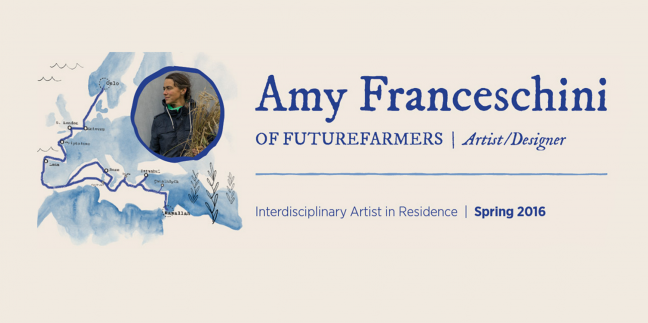Social artist and educator Amy Franceschini decided to format her lecture at the Chazen Museum of Art in an unconventional fashion and converted the room into a “sea vessel.”
Franceschini came to the Chazen Feb. 3 to discuss her collaborative art group, Future Farmers, and her current projects overseas, the Flatbread Society and Seed Journey. She, however, opted to make the experience much more interactive for her audience.

Katie Cooney/The Badger Herald
Franceschini enlisted the audience, comprised of art appreciators, students and artists, as her crew. The auditorium in L160 Elvehjem was no longer just a room, but a sea vessel.
Everyone seated received a “ticket,” and eight audience members received roles — from captain to ship magician — as Franceschini instructed them to sit in the front of the room. She proceeded to take the room on a journey to teach the history of her field in a fun and interactive way.
As a member of Future Farmers, this display was not a surprise from Franceschini — the public art group seems to have an affinity for the unorthodox angle of art.
An example rests in a famous project Franceschini participated in: the destruction of a porcelain American toilet.
Repulsed by the wastefulness of the toilet, Franceschini and a Future Farmers colleague destroyed the common device and, using the broken porcelain pieces, created a book that contained information about the inefficiency of toilets.
Franceschini founded Future Farmers in 1994 with a mission to be a collective people with a “desire to collaborate and learn from others.” From prints to more elaborate public art pieces, Franceschini said Future Farmers works toward creating art that contains important messages.
The group values the “potential for improvisation and chance,” she said, and tends to avoid over planning.
Future Farmers is currently participating in two community public art projects in Norway: an urban community garden and a bake house for making a variety of flatbreads, a food essential to the variety of cultures in the area.
Through both projects, Franceschini said Future Farmers wants to involve and unite the community, as well as participate in a symbolic blending of cultures. One way Future Farmers succeeded in doing that was through the blending of soil. They reached out to local farmers to donate soil for the foundation of the community garden. The end result was a blend of 50 types of organic farmers’ soil that left the community in awe and appreciation, she said.
Outside of Norway, Franceschini will be participating in an extensive journey with a small crew, which she refers to as the “reverse migration” of specific seeds back to their origin. These seeds are all heritage grains that fell out of production and were essentially lost in the early 1900s, Franceschini said, but returned upon rediscovery much later.
In an “art/anthropological expedition,” from Oslo to Istanbul, Franceschini hopes to help redefine the path of development, and bring attention to the culturally significant seeds.
Through the forms of public community displays, spaces and innovative expeditions, Franceschini seeks to continue making a difference through artistic activism.


